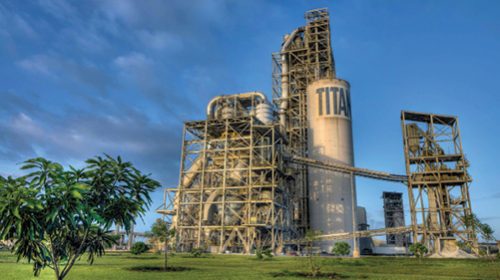Titan America LLC reports that portland-limestone cement, or Type IL, now accounts for half of the output from its Florida and Virginia mills. The Titan Florida LLC plant in Medley, known as Pennsuco, was the first Sunshine State cement operation to obtain Florida Department of Transportation approval for its Type IL cement.
“Pennsuco is the largest U.S. producer of Type IL cement,” affirms Florida Business Unit President Randy Dunlap. “We expect that the totality of our cement production at Pennsuco will be lower carbon as early as 2023.”
Outside Florida, Titan America has garnered DOT approval and specified portland-limestone cement with customers in all other areas it covers. “We are serving large customers in e-commerce, cloud services and infrastructure,” adds Mid-Atlantic Business Unit President Kevin Baird. “They are committed to sustainable development and demanding solutions for ‘green’ construction. Low carbon cement, such as our Type IL, is one of the ways we are meeting the needs of customers for these projects.”
“Ramping up the actual production and sales of portland-limestone cement beyond 50 percent of our total capacity enables a substantial reduction of the carbon footprint of our cement plants, and provides customers the low carbon solutions they need in infrastructure, housing, and commercial construction,” affirms Titan America CEO Bill Zarkalis. “It’s an important milestone, especially considering our group has recently aligned its climate mitigation targets with the most ambitious aim of the Paris Agreement.”
Weighing Paris benchmarks for curtailing global greenhouse gas emissions, Titan Cement Group, Athens, recently signed the “Business Ambition for 1.5 degrees Celsius” commitment, a global campaign led by the Science Based Targets initiative (SBTi) in partnership with the United Nations Global Compact. Signatories aim to reach net zero emissions for their operations by 2050. Titan Group was one of the first cement companies worldwide to have SBTi validate its carbon dioxide emissions reduction targets as consistent with levels required to meet Paris global temperature goals.
TAMPA TERMINAL
Concurrent with the Type IL cement shipment trajectory, Titan Florida has announced construction of a 70,000-ton dome at its Port Tampa Bay Terminal, making the operation—presently harboring 60,000 tons of bulk storage and logistics infrastructure—one of the largest of its kind in the United States. The $35 million investment supports the growing demand for Titan products and services across the Sunshine State by upgrading import capacity and expanding low carbon cement and cementitious materials stock.
With an early-2023 completion target, the dome follows recent Pennsuco plant investments. North of $20 million, they include construction of a processed engineered fuel facility, plus natural gas infrastructure and equipment. The outlays position the Medley cement kiln to transition from coal to lower carbon fuel alternatives, substantially reducing the operation’s environmental footprint as well as eliminating municipal waste from local landfills.
“Florida is one of the 10 U.S. megaregions and has a booming economy,” affirms Randy Dunlap. “Titan’s investment in our state signifies a commitment to support our customers in the infrastructure, residential, and commercial sectors with high performance products.”
“The major expansion and upgrade of our Port Tampa import terminal comes ahead of accelerating market growth and major investments in Florida’s infrastructure,” observes Titan Florida Commercial Vice President Guillermo Haberer. “It is welcome news for our customers, who seek high performance green products and solutions that support their critical growth initiatives.”
Titan Florida encompasses the Pennsuco and Port of Tampa cement operations, plus integrated aggregates, ready mixed concrete and block businesses, along with fly ash beneficiation and marketing through ST Equipment & Technology.
GCC SETS MONTANA MILL’S SHIFT TO PORTLAND-LIMESTONE CEMENT
GCC of America’s Trident Plant near Three Forks, Mont. will fully convert to portland-limestone cement (PLC) production early next year. With capacity upward of 350,000 tons, the 110-year-old operation can potentially lower its net carbon dioxide emissions by 25,000 tons annually, based on the blending of fine limestone at 5 percent to 15 percent volumes as part of the cement clinker finishing phase. PLC is a proven binder that performs similar to clinker-only portland cement with almost identical strength, workability and durability characteristics, notes GCC, which plans to expand PLC production to more of its U.S. operations in the near future.
“We believe our industry must continue to provide the homes, roads and infrastructure that shape our world while, simultaneously, addressing climate change,” says GCC U.S. Division President Ron Henley. “PLC is one piece of the puzzle to reduce greenhouse gases. Concrete made with PLC is a resilient material that easily meets the needs of our customers for generations to come.”
“Earlier this year, GCC signed the Global Cement and Concrete Association’s net zero pledge,” he adds. “PLC will help us, and our customers, reach that goal. We are committed to building a better world.”
